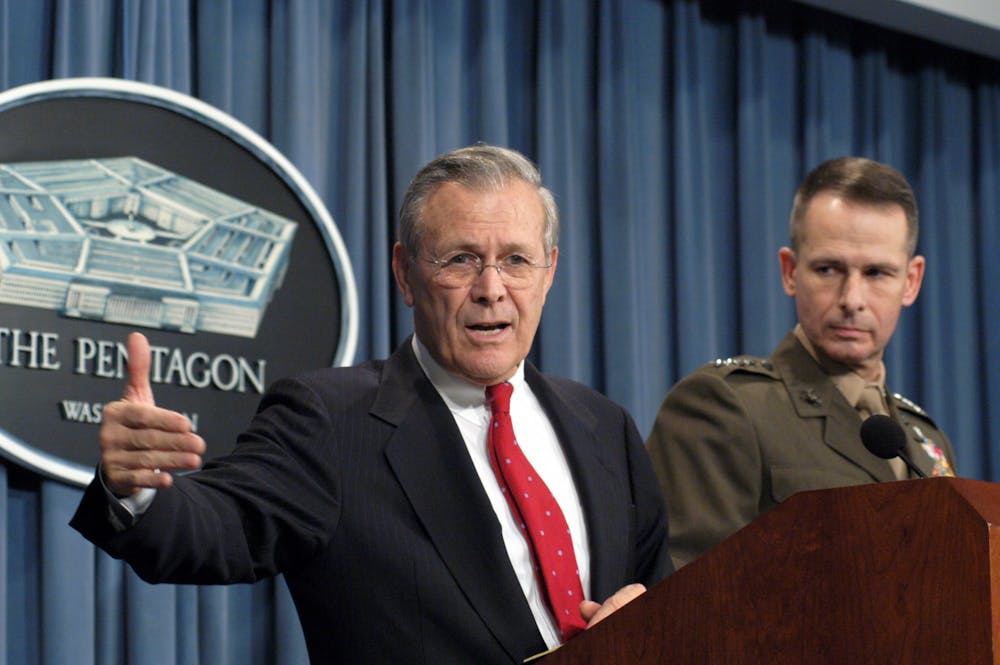The Nov. 21, 2001, issue of the Princeton Alumni Weekly lauded Donald Rumsfeld ’54 as a “wrestler, pilot, and organizer extraordinaire … lead[ing] the U.S. defense department into perhaps its toughest fight ever.” After his courageous actions on Sept. 11, 2001, which included helping to carry a stretcher from the Pentagon’s smoldering ruins, Rumsfeld basked in the country’s esteem. Right on cue, his alma mater celebrated its virtuous son: Secretary of Defense to a nation under attack.
Yet, when Rumsfeld left the Pentagon in 2006, he was disgraced and despised. Gone was the public adoration that had won him, at the age of 70, the title of “sexiest Cabinet member.” Instead, in the intervening five years, Rumsfeld had attained his most ambitious military fantasy: the U.S. invasion of Iraq, which toppled Saddam Hussein’s Ba’athist regime.
Confident in his command and convinced of his superior intelligence, Rumsfeld never questioned the neoconservative orthodoxies that compelled the U.S. to illegally invade Iraq. He never anticipated the grave atrocities, astronomical costs, and destructive counterinsurgency that inexorably followed.
After five years of abuses and lies, Rumsfeld rightly garnered America’s contempt. Though he accepted responsibility for certain shortcomings, Rumsfeld has never expressed remorse for the disastrous invasion he designed, for the torture he all but condoned at Abu Ghraib, or for his hubris, which cost the lives of nearly 4,500 U.S. service members and untold numbers of Iraqis.
We often hear, and repeat, the platitude, “Princeton in the Nation’s Service.” We are taught that being at Princeton obligates and enables us to serve the United States, as Woodrow Wilson enjoined more than a century ago. But are we prepared to do what that pledge asks of us?
At first blush, it seems that Rumsfeld, a Navy ROTC cadet at the University, fulfilled the motto. He held many of the most powerful positions in the U.S. government, and he presided over the Pentagon at a critical time. Rumsfeld’s good-faith efforts to serve his nation cannot be discounted. But his story does not end — or even begin — there.
Princeton propelled Rumsfeld’s entry into politics. In 1963, he launched a long-shot congressional bid in an affluent district near Chicago. He drafted half a dozen Princeton classmates to his modest campaign, and he invoked Princeton football to gain essential endorsements. Against the odds, he won.
Two decades later, in an Alumni Day address, Rumsfeld reminisced, “That campaign was like a Princeton reunion.” Though Rumsfeld had grown up in a family of limited means, Princeton’s elite milieu helped catapult him to Washington’s halls of power.

In the career that followed, Rumsfeld pursued his own ambitions with unrelenting resolve. In the Nixon administration, he clashed with many rivals, while also inculcating deep loyalty in his protégé, Dick Cheney. By seeking a diplomatic posting in Europe, Rumsfeld survived Watergate’s political fallout.
Untainted by scandal, he returned to the White House as Gerald Ford’s chief of staff. In the so-called Halloween Massacre of 1975, Rumsfeld brilliantly undercut his rivals, including George H.W. Bush, to become the youngest Secretary of Defense in the nation’s history. When he returned to the private sector in 1977, Rumsfeld had become a national celebrity, prominent enough to launch his own presidential campaign.
As Rumsfeld’s national repute reached its zenith, the University understood his “service” in a transactional light. Through his political celebrity, Rumsfeld, a repeat lecturer at Whig-Clio and the Wilson School, upheld his side of the public-service equation. The University reciprocated in kind. In 1985, Rumsfeld received the Woodrow Wilson Award — the University’s highest honor — conferred upon alumni who “exemplify Woodrow Wilson’s memorable phrase ‘Princeton in the nation’s service.’” Several years later, he became a Trustee.
Rumsfeld is far from the only Princetonian politician to have enjoyed such an expedient relationship with his alma mater. Adlai Stevenson, Class of 1922, George F. Kennan ’25, George P. Shultz ’42, Frank Carlucci ’52, and James Baker ’52 — all of whom received the Woodrow Wilson Award — shaped decades of U.S. foreign policy and military strategy.

Undoubtedly, they served the nation. But that truism should not shield such figures from scrutiny. Indeed, as Rumsfeld concluded in his Princeton senior thesis, “Let us be thankful that we live in a land where we can demand of those in authority, ‘Give us an account of thy stewardship.’”
As we commemorate a century of ROTC at Princeton — and recall the enormous sacrifices we ask of our service members — we should remember that public service can go awry. Power can corrupt its practitioners. The achievements that marked Rumsfeld’s contentious career — reaching the highest echelons of political influence, ascending the chain of command, even receiving the Woodrow Wilson Award — do not constitute public service in themselves.
Public service calls us to do something less soaring than Rumsfeld’s station, but all the more meaningful for its humility. Serving the nation means harnessing the privilege of our Princeton education — not for political power or personal profit, but to the benefit of our fellow Americans.
Jon Ort is a Managing Editor of The Daily Princetonian. This piece represents the views of the Managing Editor only. He can be reached at jaort@princeton.edu.








